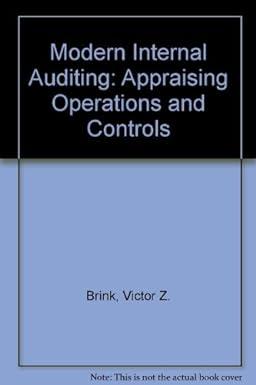Question
You are a trainee accountant at a small audit firm. Your firm was recently appointed as auditors of Fashion (Pty) Ltd, a company which sells
You are a trainee accountant at a small audit firm. Your firm was recently appointed as auditors of Fashion (Pty) Ltd, a company which sells fashionwear. The previous auditors had resigned after a dispute with the companys directors about the audit fee. The company has been operating for the last five years and has a number of branches across South Africa. The company sells for cash or on account, no cheques or credit cards are accepted. Accounts must be opened in the name of a person over the age of 21 years. On average thirty percent of annual sales are made for cash. Most of the companys inventory is imported. There is a large warehouse in Cape Town from which inventory is dispatched to the companys branches where it is either displayed on the shop floor or kept in a small storeroom. Although sales have generally been good in previous years, sales for the financial year end 31 March 2020 have shown a decline. The directors of the company attribute this to two things, negative fluctuations in foreign exchange rates which have resulted in increased costs for the companys imports, and increased competition in the market place. In an attempt to increase sales the directors decided to relax the granting of credit by extending the credit limits and terms for all existing and new account holders. The company has a small overdraft on its bank account but which is within the facility granted by the bank. When the company was formed five years ago, it was financed by 12 private investors who provided long-term loans. None of these 12 long-term loans is secured, but in terms of the loan agreement the investors are entitled to call up their loans immediately if the company does not achieve a pre-determined net profit before tax. The loan agreement requires that an annual audit of the company be carried out. The directors are very anxious that the stipulated (pre-determined) net profit before tax is achieved. Required a) Discuss the factors which your firm would have considered prior to accepting the appointment of auditor of Fashion (Pty) Ltd, based on the information above. (10) b) Define audit risk. (4) c) Evaluate the risk of material misstatement relating to the following account balances or classes of transaction at 31 March 2020 based on the information given above for the following: - Inventory (13) - Sales (6) - Accounts receivable (7) You are advised to consider the risk relating to each assertion applicable to each of the above account balances or classes of transactions.estion here
Step by Step Solution
There are 3 Steps involved in it
Step: 1

Get Instant Access to Expert-Tailored Solutions
See step-by-step solutions with expert insights and AI powered tools for academic success
Step: 2

Step: 3

Ace Your Homework with AI
Get the answers you need in no time with our AI-driven, step-by-step assistance
Get Started


